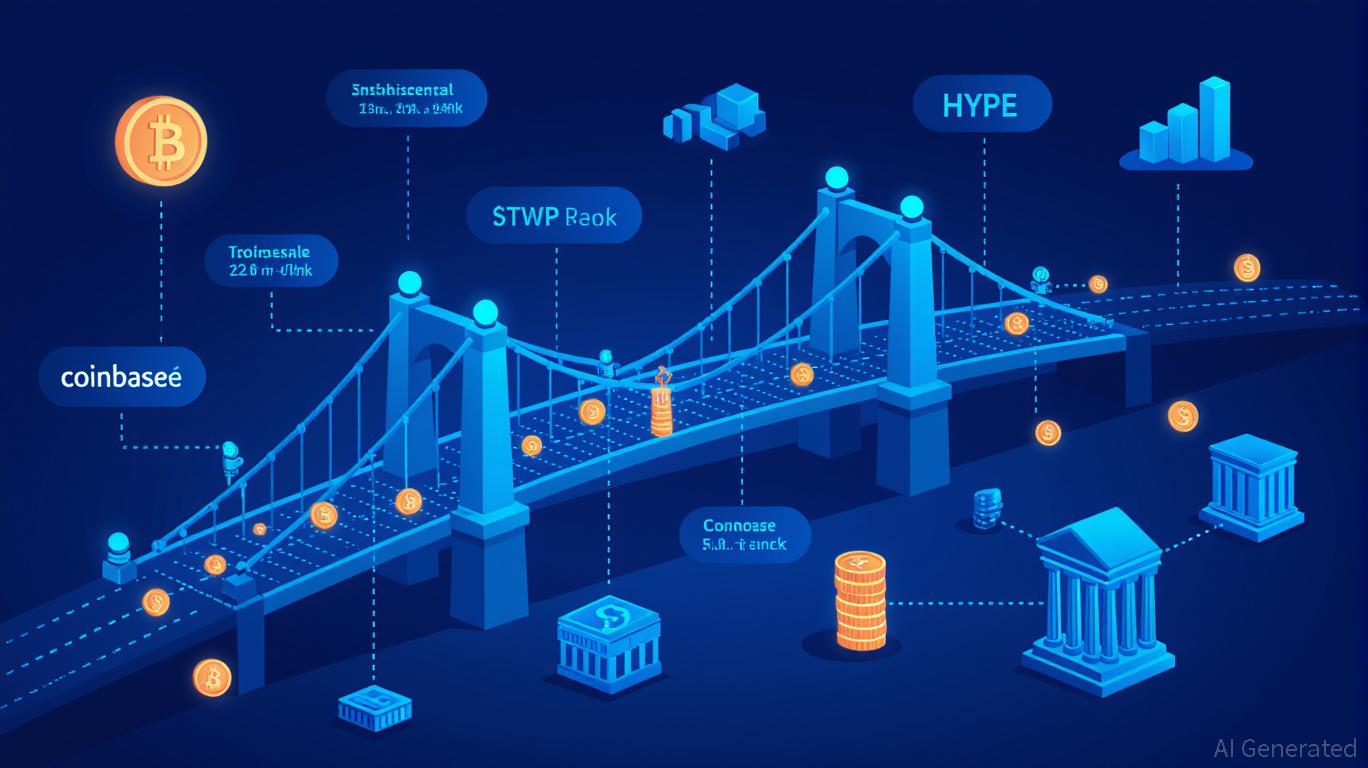Hyperliquid's Growing Influence in Crypto Trading: The Impact of Institutional Engagement on DeFi Evolution
- Hyperliquid drives DeFi mainstream adoption via institutional partnerships and a $2.15B TVL, including a HYPE token ETF application by 21Shares. - Regulatory compliance through zk-KYC and smart contract audits aligns with SEC/CFTC frameworks, accelerating institutional trust in DeFi protocols. - Zero-gas fee Layer 1 blockchain and $3T+ trading volumes position Hyperliquid as a scalable bridge between decentralized infrastructure and institutional capital. - Leadership transitions and 160% vault APYs high
Institutional Partnerships and ETF Applications: Opening Doors to Mass Adoption
Hyperliquid’s partnership with DeFi protocol Felix, formalized via a HYPE Asset Use Service (HAUS) agreement, highlights its growing reach. By providing Felix with 500,000 HYPE tokens, Hyperliquid has facilitated the launch of a perpetual futures market on its HIP-3 protocol, creating additional income streams for holders of staked HYPE assets
Interest from institutions has grown further with 21Shares filing an S-1 registration with the U.S. Securities and Exchange Commission (SEC) for a Hyperliquid ETF. Managed by Coinbase Custody and BitGo Trust, this ETF is designed to offer exposure to HYPE tokens without requiring direct token ownership, reflecting the rising appetite for crypto-based ETFs

Navigating Regulatory Compliance: Building Institutional Confidence
The regulatory landscape for DeFi in 2025 is clearer than ever before. With the SEC prioritizing investor safeguards and the CFTC overseeing derivatives, DeFi platforms must operate within a dual regulatory structure. Hyperliquid’s approach to compliance—focusing on transparent smart contracts, thorough governance token audits, and privacy-centric KYC/AML protocols—
The SEC’s recent endorsement of universal listing rules for spot crypto ETFs has also shortened the approval process,
Market Impact and Technical Advantages: Meeting Institutional Needs at Scale
Hyperliquid’s on-chain perpetual exchange, which operates on a proprietary Layer 1 blockchain, delivers zero gas fees and remarkable scalability. With trading volumes surpassing $3 trillion and open interest reaching $7.2 billion, the platform
The platform’s technological strengths are further highlighted by its dominance in the DeFi perpetual futures market, which is nearing $1 trillion in monthly trading activity. As noted in a Bitget report, Hyperliquid’s removal of gas fees and nearly instant settlement
Systemic Changes and Future Prospects
Hyperliquid’s impact goes beyond its own statistics. Strategic moves like the HAUS partnership with Felix are expanding decentralized trading and boosting TVL. However, recent executive changes—including CEO Michael Rowe’s departure and Hyunsu Jung stepping in as interim leader—have brought some uncertainty ahead of the Q3 2025 earnings report
Despite these headwinds, optimism remains high. Hyperliquid’s vault APYs have soared to 160%, and the Open Interest-Weighted Funding Rate has risen to 0.0085%,
Conclusion
The surge of institutional interest in Hyperliquid represents more than a passing phase; it marks a fundamental transformation in DeFi trading. By adhering to regulatory standards, embracing technological progress, and forming key alliances, Hyperliquid is setting new benchmarks for decentralized finance. As the boundaries between DeFi and traditional finance continue to blur, platforms like Hyperliquid are poised to play a pivotal role in shaping the next era of global financial markets.
Disclaimer: The content of this article solely reflects the author's opinion and does not represent the platform in any capacity. This article is not intended to serve as a reference for making investment decisions.
You may also like
China’s economic framework faces challenges from both international trade tensions and internal pressures
- China's economy faces stalling risks as trade tensions, supply chain disruptions, and domestic challenges converge, with record investment declines undermining growth. - Trump's 100% tariffs on Chinese imports and export controls, alongside Beijing's retaliatory measures, create volatility despite temporary trade truce efforts. - Sector-specific risks persist: antimony export bans are suspended, but rare earths and semiconductor disputes remain unresolved, while real estate-linked industries like Lingong

Alibaba and JPMorgan's Tokenization Breakthrough: Driving $3 Billion in Worldwide B2B Trade
- Alibaba partners with JPMorgan to launch tokenized USD/euro payments by December, aiming to cut cross-border transaction delays and costs via blockchain technology. - The initiative uses JPMorgan's JPMD token to enable real-time global settlements, bypassing intermediaries that typically slow down 72-hour international transfers. - Complementing this, Alibaba introduces AI tools like AI Mode ($20/month) for supplier comparisons and agentic pay for automated contract drafting, diversifying revenue streams

Silicon to Blockchain: ARK's Bold Shift Toward Transformative Technologies
- ARK Invest sold $22.5M AMD shares on Nov 13, 2025, reallocating to crypto firms Circle and Bitmine, signaling a strategic shift toward digital infrastructure and biotech . - The firm divested over $29M in Pinterest , Regeneron , and Salesforce while boosting crypto exposure via 188K Circle shares and 242K Bitmine shares amid sector declines. - Biotech investments in Beam and Recursion extended a weeklong accumulation pattern, reflecting ARK's focus on gene-editing and pharmaceutical innovation. - Total t

Privacy Competition Intensifies: EU Relaxes Regulations Amidst Blockchain Boom
- EU's Digital Omnibus reforms face backlash for weakening GDPR protections, enabling Big Tech to exploit user data under "legitimate interest" exemptions. - Privacy-focused blockchain project COTI surges as investors seek alternatives, leveraging Garbled Circuits to enable programmable data privacy in smart contracts. - COTI's market cap doubled in November amid growing demand for decentralized privacy solutions, contrasting EU's regulatory shift toward AI-driven economic priorities. - The tension highlig
